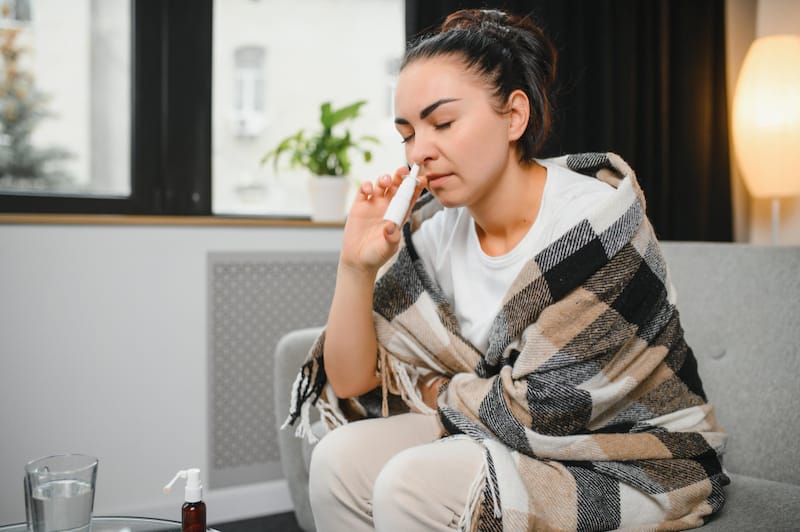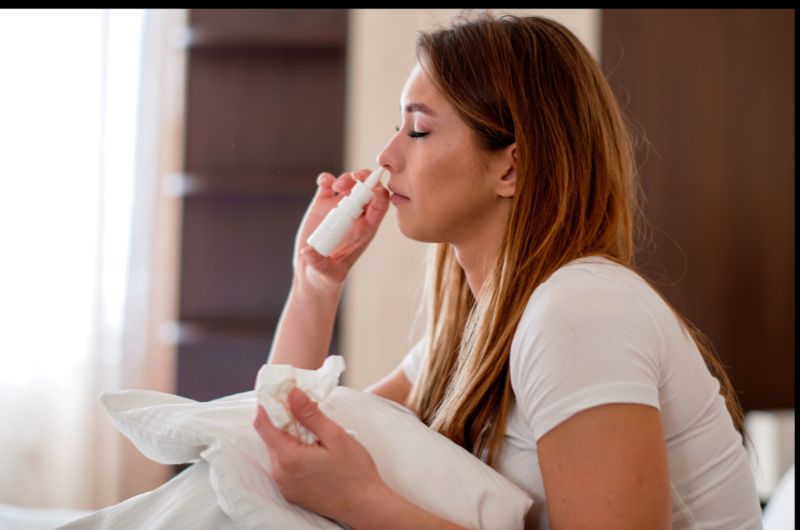Swallowing some medicine from your nasal spray the first time you use it shouldn’t cause serious harm. But, to children five years old and below, swallowing 1-2 mL of decongestant nasal spray could lead to fatally severe intoxication. Even in adults, some nasal sprays could put you at risk of harmful heart and mental complications when misused or overused. Decongestant nasal sprays could also cause “addiction” and might worsen your stuffy nose.
It’s common and inevitable that some liquid from your nasal spray will drip down your throat. Well, that is because your throat connects with your nasal passages. So if you’re misusing nasal sprays, you can expect some medicine to go down your throat.
Nasal sprays are special sprays that deliver medication to your nasal cavity. It helps treat nasal congestion and seasonal allergies or cold symptoms.
If you continuously suffer from a clogged or runny nose, nasal sprays can give you that satisfying relief!
What are the different types of nasal sprays?

There are different types of nasal sprays, and it’s essential to know how to use them correctly.
Though these nasal sprays work similarly, each type contains different medications to target specific symptoms.
Below are the types of nasal sprays:
- Decongestants. They relieve irritation that causes stuffiness by narrowing swollen, irritated blood vessels in the lining of your nose.
- Steroid sprays. These relieve nasal congestion and other allergy symptoms by reducing inflammation in your nasal passages.
- Antihistamine sprays. They work similarly to oral histamines blocking the effects of histamine that causes sneezing, itching, and runny nose.
- Anticholigernic sprays. These treat runny noses by drying up extra mucus.
- Cromolyn sodium sprays. These inhibit and stabilize mast cells helping with nasal congestion, sneezing, and runny nose.
- Saline spray or gel. It contains saline and is suitable for moisturizing your nose but won’t likely relieve your nasal congestion.
- Nasal irrigations. Neti pot is an example. They help in loosening and rinsing out mucus from your nose.
These nasal sprays can be available with or without a prescription from your doctor. But, before using any of these products, consult your doctor first.
There is a specific period on how long you should use a particular nasal spray.
All types can result in nosebleeds when misused. Generally, nasal steroid sprays are known as first-line treatments and are the most effective for treating nasal allergies.
One clinical study proved that nasal sprays were far more effective in treating nasal conditions than oral medications.
Nasal sprays are very good in targeting your nasal allergy symptoms while reducing the side effects that your body will get from oral tablets.
What happens if you accidentally swallow nasal spray?
Some medications from nasal sprays will leave an unpleasant taste and may give you a dry throat after accidentally swallowing them.
You can spit the medicine out your throat and/or drink water to relieve the unpleasant taste.
Don’t worry about occasionally accidentally swallowing nasal sprays because they won’t cause any severe effects.
But regularly swallowing it would put you at risk of fungal infection in your esophagus.
When you feel like you’ve swallowed some from the nasal spray, you may have to repeat the dose and apply it correctly to ensure that you inhaled the medicine.
The U.S. Food and Drug Administration reports that accidental swallowing of over-the-counter decongestants nasal spray on children five years old and below can result in coma, decreased heart rate, decreased breathing, and sleepiness.
Swallowing 1-2 mL of such nasal sprays can seriously harm young children.
Signs and symptoms of nasal spray poisoning

Some nasal sprays contain active ingredients that can cause serious harm when swallowed or used too much.
The U.S. Food and Drug Administration warns that nasal decongestant propylhexedrine (Benzedrex) can lead to harmful heart and mental complications.
Overuse and misuse of propylhexedrine could put you at risk of hospitalization, disability, and even death.
Please call an ambulance or seek medical attention immediately when you experience the following symptoms below from using propylhexedrine:
- Severe anxiety or agitation, confusion, hallucinations, or paranoia
- Fast or abnormal heart rate
- Chest pain or tightness that may feel like spreading to other parts of your body (it could signal a heart attack)
- Feeling uncomfortably hot
- Sudden numbness in some parts of your body, especially on one side
- Sudden headache and dizziness
- Tremors
- Nausea and vomiting
How can I treat nasal spray poisoning?
When you experience the following symptoms mentioned above, and your doctor suspects an overdose or misuse, they will determine whether you used propylhexedrine alone or with other substances.
Currently, there’s no available treatment for propylhexedrine intoxication. However, your doctor may discuss methods and prescribe medications to help manage your symptoms.
Are you addicted to nasal spray?
Some patients have concerns about getting addicted to using over-the-counter nasal sprays.

But, according to Mayo Clinic, over-the-counter decongestant nasal sprays won’t cause cravings related to addiction. Instead, you’re most likely to experience the “rebound effect.”
According to WebMD, the “rebound effect” happens when your nose gets so used to the medicine, causing you not to get the relief the same way you first used it.
As a result, you’ll want to use the nasal spray more to relieve your stuffy nose. But, once you stop using it, your congestion worsens.
If you use nasal sprays for more than 3-5 days, you are much more prone to experiencing the rebound effect.
Nasal sprays that contain the following medicines can cause the rebound effect. Most of them are available over the counter:
- Phenylephrine (Afrin, Afrin Children’s)
- Oxymetazoline (Afrin, Vicks Decongestant)
Only nasal sprays that cause the blood vessels in your nose to shrink can result from rebounding congestion.
If you’re using nasal steroid sprays, like fluticasone (Flonase) and mometasone (Nasonex), worry less because these won’t cause rebound congestion.
Below are signs that you have rebound congestion:
- Your nasal spray doesn’t seem to work. You feel like you need to use it more often.
- Your stuffy nose worsens as time goes on. Usually, nasal congestion due to allergies, colds, and viruses improves as your body fights off these infections. Rebound congestion occurs when you’re using nasal sprays, but you feel much worse as time passes.
- Your nose starts feeling achy. You’re feeling your nose getting heavy or achy as it swells.
How to get rid of rebound congestion?
Below are ways to help you get rid of depending too much on decongestant nasal sprays:
- Stop using decongestant nasal sprays. If you can’t go full-on “cold turkey,” you might want to try stopping it gradually.
- Try using nasal steroid sprays. Steroids can also reduce swelling and won’t cause any rebound congestion. But, it won’t give you relief immediately as much as decongestant sprays.
- Try using nasal saline sprays. Flushing your clogged nose with a “saline” solution or gel can relieve your clogged nose by reducing inflammation and promoting healing.
When you start to wean off nasal decongestant spray, you can start feeling better from rebound congestion within two weeks.
But it could also take several months or even years, especially when you’ve already used decongestant nasal sprays for a long time.
Remember, don’t use nasal decongestant sprays for more than three consecutive days to avoid the “rebound effect.”
After using the treatment for a maximum of three days, start thinking of other ways to relieve your nasal congestion, such as taking oral decongestants, nasal sinus rinses, and nasal steroid sprays.
How can I avoid swallowing the nasal spray fluid?
You must use nasal sprays correctly or as directed to avoid swallowing the medication.
Regular nasal sprays are used differently from pump sprays. So, you must follow proper instructions for using these two nasal sprays.
Below are the steps for using nasal sprays:
For preparation:
- Before applying, gently blow your nose to clear them out.
- Please wash your hands with soap and water and dry them using a towel or paper towel. If you have no soap or water, use hand sanitizer instead.
- Shake the nasal spray bottle as directed by the label or your doctor.
For regular nasal sprays:
- Gently press the other side of your nose, not receiving the medication.
- While keeping your head upright, position the bottle on the other nostril. Aim to spray towards the back of your nose so that it reaches your sinuses.
- Gently squeeze the bottle as you breathe in slowly and deeply.
- You can sniff gently once or twice. You don’t want to taste the medicine at the back of your throat.
- Wait at least 10 seconds before spraying again.
- Repeat the following steps on the other nostril.
For pump nasal sprays:
- “Prime” the bottle first as directed. You can do this by spraying or squirting a small amount into the air or on a tissue until a fine mist comes out.
- With your head tilting slightly forward, close the nostril that’s not receiving the medication.
- Hold the bottle with your index and middle finger on each side at the top while your thumb is at the bottom.
- Insert the tip of the pump bottle into your nostril. Squeeze or pump the pump bottle as you breathe in slowly and deeply.
- Wait at least 10 seconds before giving another spray.
- Repeat the following steps on your other nostril.
After using:
- Put the cap on the bottle and store it as directed on its packaging.
- Try not to sneeze or blow your nose right after using the spray.
- Wash your hands thoroughly to remove any medication.
FAQs
Does nasal spray go into your lungs?
Nasal sprays shouldn’t go to your lungs because they are designed to act locally on your nasal passages.
So, when you use them correctly, they should be absorbed directly by the blood vessels in your nasal cavity.
Takeaway
Swallowing medication from nasal sprays may give you an uncomfortable feeling in the back of your throat. But, it shouldn’t harm you severely, especially when it only accidentally happens rarely.
You can avoid swallowing the medication by following the proper way to use nasal sprays.
Watch out for your kids or any young people, and keep over-the-counter nasal sprays out of their reach. Swallowing small amounts of decongestant sprays can be toxic to them.
Don’t use over-the-counter decongestant nasal sprays for more than three consecutive days because it can lead to rebound congestion. Instead, when three days have passed, consider taking oral decongestants, nasal sinus rinses, and nasal steroid sprays.
Resources
- https://www.healthline.com/health/nasal-congestion
- https://www.fda.gov/safety/medical-product-safety-information/benzedrex-propylhexedrine-drug-safety-communication-fda-warns-abuse-and-misuse-nasal-decongestant
- https://www.drugs.com/drug-class/nasal-steroids.html


